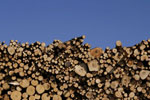Three environmental groups have submitted a letter to British Columbia Premier, Christy Clark, to ask the government to speed up the process of implementing the Great Bear Rainforest Agreement, which is meant to ensure 70 percent of old-growth forest is maintained.
“For the communities of the Great Bear Rainforest, a healthy economy depends on a healthy forest,” Valerie Langer, Senior Campaigner with ForestEthics, said in a press release. “British Columbians need the province to show leadership by following through on their commitments to protecting the forest and improving the lives of the people in the region.” Forestethics, along with Greenpeace and the Sierra Club, authored the letter.
Currently half of the old-growth forest is protected, but the groups say the government is lagging on designating the final 20 percent.
“The science is very clear that we need to protect about 70 per cent of the natural level of old-growth forest if we want to save the Great Bear Rainforest from inevitable decline,” said Eduardo Sousa, Senior Forests Campaigner with Greenpeace.
A government spokesperson responded that while they “support a quicker timeline” they must take into account other parties in the agreement.
“In March 2009, all parties agreed to a five-year implementation plan, so all parties, including Coastal First Nations and Nanwakolas Tribal Council would need to endorse an accelerated timeline,” the statement reads.
Although the agreement was set to be fulfilled by 2014, green groups would like to see it finished by next year before elections.
The Great Bear Rainforest Agreement was reached in 2006 between environmental groups, logging companies, indigenous people, and the Canadian government. The largest temperate rainforest in the world, the Great Bear Rainforest spreads over 16 million acres, and is home to the Kermode bear (Ursus americanus kermodei) a subspecies of black bear that occasionally sports all-white coats.
In addition to logging, activists are fighting the Enbridge Northern Gateway Pipelines project in the forest. Supported by the Canadian government, the project would build two industrial pipelines through the forest to bring oil from Canada’s tar sands to its western coast for export to China. The scheme would also bring oil tankers to the pristine rainforest coastline. Last week over a thousand people rallied against the pipeline in the port town of Prince Rupert, which has a population of just under 13,000.
Related articles
12,000 surround White House to protest tar sands pipeline

(11/07/2011) One year to the day before the 2012 US election, up to 12,000 activists encircled the White House to protest the Keystone XL pipeline, a proposed 1,700 mile pipeline that would carry oil from Canada’s infamous tar sands to the US and other foreign markets. Critics of the TransCanada pipeline have warned of potential spills in America’s heartland as well as the climate impacts of allowing more tar sands oil, which has a higher carbon footprint than conventional sources, into the US and other markets. The issue has galvanized climate and environmental activists in the US with the massive rally on Sunday preceded by civil disobedience actions in late summer that lead to the arrests of 1,253 people.
Economic slowdown leads to the pulping of Latvia’s forests

(01/23/2012) The economic crisis has pushed many nations to scramble for revenue and jobs in tight times, and the small Eastern European nation of Latvia is no different. Facing tough circumstances, the country turned to its most important and abundant natural resource: forests. The Latvian government accepted a new plan for the nation’s forests, which has resulted in logging at rates many scientists say are clearly unsustainable. In addition, researchers contend that the on-the-ground practices of state-owned timber giant, Latvijas Valsts meži (LVM), are hurting wildlife and destroying rare ecosystems.
Beaver dam lessens impact of massive oil spill in Canada
(05/09/2011) The Canadian province of Alberta has suffered its worst oil spill in 35 years with 28,000 barrels of oil (over a million gallons) spilling from a ruptured pipeline operated by Plains Midstream Canada in the Canadian boreal forest. The spill has sullied wetlands near Peace River.